- Home
- Patricia Cornwell
Trace Page 30
Trace Read online
Page 30
“That flowerpot under the bush there.” He looks at a huge, unkempt boxwood and a muddy flowerpot barely visible beneath it. “The key’s under it.”
She steps off the porch and works her hands between branches, and sees that the pot is filled with several inches of green rainwater that smells like swamp water. She moves the pot and finds a flat square of aluminum foil covered with dirt and cobwebs. Folded inside it is a copper key as tarnished as an old penny. No one has touched this key in some time, months at least, maybe longer, she thinks, and on the porch she gives it to Marino because she doesn’t want to be the one to unlock the house.
The door creaks open to a musty odor. It is cold inside, and then she thinks she smells cigars. Marino feels for a light switch, but when he finds one and flips it up and down, nothing happens.
“Here.” Scarpetta hands him a pair of cotton gloves. “I just happened to have your size.”
“Huh.” He works his huge hands into the gloves while she puts on a pair too.
On a table against a wall is a lamp, and she tries that with success. “At least the electricity is on,” she says. “I wonder if the phone is.” She picks up the receiver of an old black Princess phone and holds it up to her ear and hears nothing. “No phone,” she says. “I keep thinking I smell old cigar smoke.”
“Well, you gotta keep power or your pipes will freeze,” Marino says, sniffing and looking around, and the living room seems small with him in it. “I don’t smell cigars, just dust and mildew. But you’ve always been able to smell shit I can’t smell.”
Scarpetta stands in the glow of the lamp, staring across the small, dim room at the floral upholstered couch beneath the windows and a blue Queen Anne chair in a corner. Piled on the dark wooden coffee table are stacks of magazines, and she heads that way and begins to pick them up to see what they are. “Now this I wouldn’t have expected,” she says, looking at a copy of Variety.
“What?” Marino steps closer and stares at the black-and-white weekly.
“A trade publication for the entertainment industry,” Scarpetta says. “Strange. A year ago last November,” she reads the date on it. “But still very strange. I wonder if Mrs. Towle, whoever she is, has ties with the movie business.”
“Maybe she’s just starstruck like half the rest of the world.” Marino isn’t very interested.
“Half the rest of the world reads People, Entertainment Weekly, that sort of thing. Not Variety. This is hard-core,” she says, picking up more magazines. “Hollywood Reporter, Variety, Variety, Hollywood Reporter, going back some two years. The last six months aren’t here. Maybe the subscription expired. Mailing label is Mrs. Edith Arnette, this address. That name mean anything to you?”
“Nope.”
“Did the real-estate agent say who used to live here? Was it Mrs. Towle?”
“He didn’t say. I got the impression it was Mrs. Towle.”
“Maybe we should do better than an impression. How about calling him.” She unzips her black scene kit and pulls out a heavy plastic trash bag, and she loudly shakes it open and drops in the copies of Variety and the Hollywood Reporter.
“You taking those?” Marino stands in a doorway, his back to her. “Why?”
“Can’t hurt to check them for prints.”
“Stealing,” he says, opening a piece of paper and reading the number on it.
“Trespassing, breaking and entering. May as well steal,” she says.
“If it turns out to be something, we don’t have a warrant.” He is playing with her a little.
“Do you want me to put them back?” she asks.
Marino stands in the doorway and shrugs. “We find something, I know where the key is. I’ll sneak ’em back inside and get a warrant after the fact. I’ve done it before.”
“I wouldn’t admit that in public,” she comments, leaving the bag of magazines on the dusty hardwood floor and moving to a small table to the left of the couch and thinking she smells cigars again.
“A lot of things I don’t admit in public,” he replies, entering a number in his cell phone.
“Besides, this isn’t your jurisdiction. You can’t get a warrant.”
“Don’t worry. Me and Browning are tight.” He stares off as he waits and she can tell by his tone that he’s gotten voicemail when he says, “Hey, Jim. Marino here. Was wondering who lived in this house last? What about an Edith Arnette? Please call me ASAP.” He leaves his number. “Huh,” he says to Scarpetta. “Ol’ Jimbo had no intention of meeting us here. Do you blame him? What a dump.”
“It’s a dump all right,” Scarpetta says as she opens a drawer in a small table to the left of the couch. It is full of coins. “But I’m not sure that’s why he didn’t come. So you and Detective Browning are tight. The other day you were afraid he might arrest you.”
“That was the other day.” Marino steps inside the dark hallway. “He’s an okay guy. Don’t worry. I need a warrant, I’ll get a warrant. Enjoy reading about Hollywood. Where the hell are the lights around here?”
“Must be fifty dollars in quarters.” Coins lightly clink as Scarpetta pushes her fingers through them inside the drawer. “Just quarters. No pennies, nickels, or dimes. What do you pay for in quarters around here? Newspapers?”
“Fifty cents for the Garbage-Patch,” he snidely refers to the local Times-Dispatch. “Got one just yesterday out of the machine in front of the hotel and it cost me two quarters. Twice what the Washington Post is.”
“It’s unusual to leave money in a place where no one lives,” Scarpetta says, shutting the drawer.
The hallway light is out, but she follows Marino into the kitchen. Right away it strikes her as odd that the sink is full of dirty dishes and the water is disgusting with congealed fat and mold. She opens the refrigerator and is increasingly convinced that someone has been staying in the house, and not long ago at all. On the shelves are cartons of orange juice and soy milk that have expiration dates for the end of this month, and dates on meat in the freezer show it was purchased some three weeks ago. The more food she discovers in cabinets and the pantry, the more anxious she becomes as her intuition reacts before her brain does. When she moves to the end of the hallway and begins to explore the bedroom at the back of the house, she smells cigars, she’s sure of it, and her adrenaline is rushing.
The double bed is covered with a cheap dark blue spread, and when she pulls it back she sees that the linens beneath it are wrinkled and soiled and scattered with short hairs, some of them red hairs, probably head hairs, and others darker and curlier and probably pubic hairs, and she sees the stains that have dried stiff and she suspects she knows what those stains are. The bed faces a window, and from it she can see over the wooden fence, she can see the Paulsson house, she can see the dark window that was Gilly’s. On a table by the bed is a black and yellow ceramic Cohiba ashtray that is quite clean. There is more dust on the furniture than there is in the ashtray.
Scarpetta does what she needs to do and has little awareness of time passing or shadows changing or the sound of rain hitting the roof as she goes through the closet and every dresser drawer in that room and finds a withered red rose still in its plastic wrapper; men’s coats, jackets, and suits, all out of style and grim and buttoned up and primly arranged on wire hangers; stacks of neatly folded men’s pants and shirts in somber colors; men’s underwear and socks, old and cheap; and dozens of dingy white handkerchiefs, all folded into perfect squares.
Then she is sitting on the floor, pulling cardboard boxes out from under the bed and opening them and going through stacks of old trade publications for mortuary science and funeral home directors, a variety of monthly magazines with photographs of caskets and burial clothes and cremation urns and embalming equipment. The magazines are at least eight years old. On every one she has looked at so far, the mailing label has been peeled off and all that is left are only a few letters and part of a zip code here and there but nothing more, not enough to tell her what she wants to know.
/>
She goes through one box after another, looking at every magazine, hoping for a complete mailing label and finally there are a few, just a few, at the very bottom of a box. She reads the label and sits on the floor staring at it, wondering if she’s confused or if there might be a logical explanation, and all the while she is yelling for Marino. She calls out his name as she gets to her feet and stares at a magazine that has a casket shaped like a race car on the cover.
“Marino! Where are you?” She steps into the hallway, looking and listening. She is breathing hard and her heart is beating hard. “Damn it,” she mutters as she walks quickly along the hallway. “Where the hell did you go? Marino?”
He is on the front porch, talking on his cell phone, and when his eyes meet hers, he knows something too, and she holds up the magazine, holds it close to him. “Yeah. We’ll be here,” he says into the phone. “I have a feeling we’ll be here all night.”
He ends the call, and his eyes have that flat look in them that she’s seen before when he smells his quarry and has to find him. No matter what, he has to. He takes the magazine from her and studies it in silence. “Browning’s on his way,” he then says to her. “He’s at the magistrate’s right now, getting a warrant.” He turns the magazine over and looks at the mailing label on the back cover. “Shit,” he says. “Jesus Christ,” he says. “Your old office. Jesus Christ.”
“I don’t know what it means,” she replies, as a soft cold rain pats the old slate roof. “Unless it’s someone who used to work for me.”
“Or someone who knows someone who used to work for you. The address is the OCME.” He checks again. “Yeah, it is. Not the labs. June 1996. Definitely when you were there, all right. So your office had a subscription to this.” He steps back into the living room, moving close to the lamp on the table, and flips through the magazine. “Then you must know who was getting it.”
“I never authorized a subscription to that magazine or anything like it,” she replies. “Not a funeral home magazine. Never. Someone either didn’t have my permission or got it on his own.”
“Got any idea who?” Marino places the magazine beneath the lamp on the dusty table.
She thinks of the quiet young man who worked in the Anatomical Division, the shy young man with red hair who retired on disability. She hasn’t thought of him since he left, probably not once. There would be no reason to think of him.
“I have an idea,” she replies unhappily. “His name is Edgar Allan Pogue.”
41.
NO ONE IS HOME inside the salmon-colored mansion, and he realizes the disappointing truth that somehow his plans were spoiled. They had to be, or he would notice some sort of activity around the mansion or evidence of earlier activity, such as crime scene tape, or he would have heard about it in the news, but when he drives slowly past where the Big Fish lives, the mailbox looks fine. The little metal flag is down and there is no sign that anyone is home.
He drives around the block back out to A1A and can’t resist looping around again as he thinks about the mailbox flag. It was up when he placed the Big Orange in the mailbox, he’s quite sure of that. But it does enter his racing mind that the chlorine bomb might still be inside the mailbox, all swollen with gases and ready to explode. What if it is? He has to know. He won’t sleep or eat unless he knows, and anger writhes in its deep place, an anger as familiar and present as the short breaths he breathes. Just off A1A on Bay Drive is a row of one-story apartments that are painted white, and he pulls into the parking lot and gets out of his white car. He begins to walk, and the kinky long tresses of his black wig stray in front of his eyes and he pushes them back and heads down the street in the low sun.
He can smell the wig at times, usually when he is thinking about something else or busy, and then the odor touches the inside of his nose and is hard to describe. The odor of plastic is about the best he can come up with, and he is puzzled because the wig is human hair, not synthetic, and it shouldn’t smell like plastic, new plastic, unless what he is really detecting is some chemical it was treated with when it was put together. Palm fronds flutter against the dusky sky, and fragile ribbons of clouds are lit up pale orange around the edges as the sun settles in. He follows the sidewalk, noticing the cracks and the grass sprouting up between them. He is careful not to look at the fine houses he passes, because people in neighborhoods like this are fearful about crime and keenly aware of strangers.
Just before he reaches the salmon-colored mansion he passes a big white house that rises squarely against the sunset, and he wonders about the lady inside. He has seen her three times and she deserves to be ruined. Once late at night when he was on the seawall behind the salmon-colored mansion, he saw her in the third-floor bedroom window. The shades were up and he could see the bed and other furniture and a huge flat-screen TV that was on, and pictures of people running and then a high-speed motorcycle chase flashed on the screen. She was naked in front of the window, pressed up against it, her breasts grotesquely flattened against the glass, and she touched the glass with her tongue and moved in disgustingly immoral ways. At first he worried that she might see him out on the seawall, but she seemed half asleep as she put on her act for boaters out at night and the Coast Guardsmen across the inlet. Pogue would like to know her name.
He wonders if she leaves her back door unlocked and the alarm off when she goes out by the pool, if she forgets when she comes back in. She might not go out by the pool, he considers. He’s never seen her outside her house, never seen her on the patio or out by the boat, not once. If she never leaves her house, that would make it hard for him. He fingers the white handkerchief in his pocket, pulling it out and wiping his face with it, glancing around him, moving to the driveway and mailbox next door. He acts relaxed, as if he belongs here, but he knows his long dark tangled tresses don’t belong here, not hair that came from a black or a Jamaican, not in this white-bread neighborhood.
He has been on this street before. He was wearing the wig then, and he has always worried that it would call attention to him, but better to have on the wig than to look like himself. Opening the Big Fish’s mailbox, he is neither disappointed nor relieved that it is empty. He smells no chemicals and sees no damage, not even a discoloring of the black paint on the inside of the mailbox, and he has to accept the fact that most likely his bomb had no effect, none whatsoever. It does please him slightly that the bomb is gone, that someone found it. Then she knows about it, at least, and that is better than nothing, he supposes.
It is six P.M. and the naked lady’s house begins to glow against the encroaching dark, and he steals a glance up her pink concrete walkway, through the wrought-iron screen to the courtyard and the massive glass front doors. Pogue moves on at a relaxed pace and thinks of her against the window and hates her for pressing herself against that huge window, hates her for being ugly and disgusting and flaunting her ugly, disgusting body. People like her think they rule the world and are doing people like him a favor when they stingily share their flesh or favors, and the naked lady is stingy. She is all show, that is all.
A tease, that’s what Pogue’s mother used to call women like the naked lady. His mother was a tease, a terrible tease, which is why his father finally drank himself into believing it was a fine idea to hang himself from a rafter in the garage. Pogue knows all about teases, and should a man in a tool belt and work boots knock on the naked lady’s door and ask her to finish what she started, she would scream furious and terrified obscenities and call the police. That’s what people like the naked lady do. They do it daily and think nothing of it.
He has gone many days now and has not finished what he started. That is too long. Before days it was weeks, and then three months, but that’s assuming he counts digging up someone who is already finished. That’s assuming he also counts carrying out all those other finished people in their leaky, dusty boxes from belowground in the Anatomical Division, from his private space down there, and struggling with scores of boxes, carrying up the stairs tw
o or three finished people at a time, his stiff lungs on fire and hardly able to breathe, and getting the boxes into the parking lot and setting them down, then going back for more, then putting all of them into his car and eventually into big trash bags, and this was back in September when he heard the news, the terrible, outrageous news that his building was going to be torn down.
But dug-up bones and dusty boxes aren’t the same thing, they just aren’t. All those people are already finished, and that certainly isn’t the same thing as finishing the person himself. Pogue has felt the power and the glory and was vindicated briefly when he felt it, and he slips the faint-plastic-smelling wig off his red head as he closes himself inside his car. He drives out of the white apartment parking lot, reentering the dark early-night streets of South Florida, and his thoughts carry him in the direction of the Other Way Lounge.
42.
LIGHTS FROM flashlights poke like long yellow pencils in the black backyard. Scarpetta stands by the window, looking out, hopeful the police will have some luck at this hour, but she is pricked by doubt. What she suggested seems remote if not paranoid, perhaps because she is very tired.
“So you don’t remember him living with Mrs. Arnette?” Detective Browning asks, tapping a pen on top of a notepad and chewing gum as he sits in a simple wooden chair inside the bedroom.
“I didn’t know him,” she replies, watching the long lights moving in the dark and feeling cold air seep in around the window. Chances are, they won’t find anything, but she worries that they will. She thinks about the bone dust in Gilly’s mouth and on the tractor driver and worries the police will find something. “I wouldn’t have any way of knowing who he lived with, assuming he lived with anybody. I can’t remember ever having a real conversation with him.”
“Not sure what you’d talk about with a squirrel like that.”
“Unfortunately, those who worked in the Anatomical Division were viewed as rather odd by everybody else. What they did was off-putting to the rest of my staff. They were always invited to parties, picnics, the Fourth of July cookout I always had at my home. But you never knew if they’d show up or not,” she says.

 Blow Fly
Blow Fly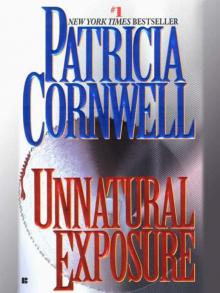 Unnatural Exposure
Unnatural Exposure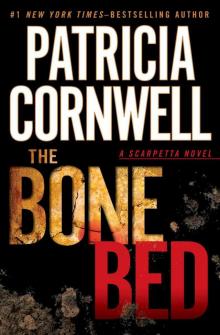 The Bone Bed
The Bone Bed Book of the Dead
Book of the Dead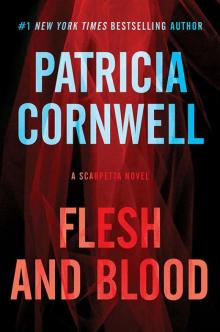 Flesh and Blood: A Scarpetta Novel (Scarpetta Novels Book 22)
Flesh and Blood: A Scarpetta Novel (Scarpetta Novels Book 22)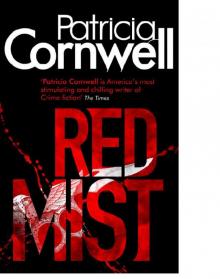 Red Mist
Red Mist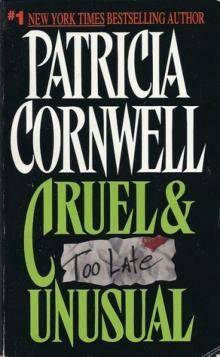 Cruel & Unusual
Cruel & Unusual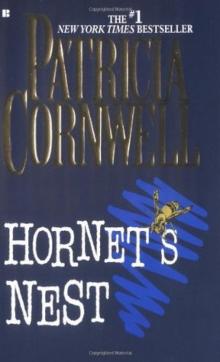 Hornet's Nest
Hornet's Nest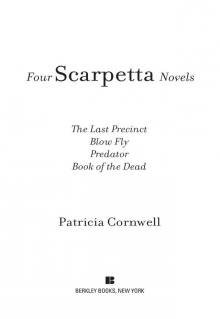 Four Scarpetta Novels
Four Scarpetta Novels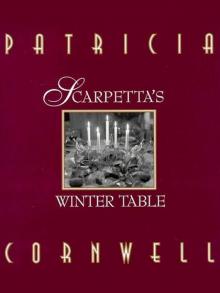 Scarpetta's Winter Table
Scarpetta's Winter Table Isle of Dogs
Isle of Dogs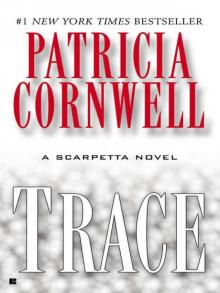 Trace
Trace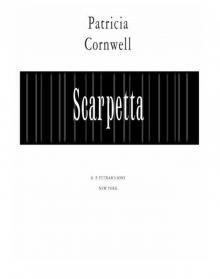 Postmortem
Postmortem Body of Evidence ks-2
Body of Evidence ks-2 Southern Cross
Southern Cross All That Remains
All That Remains Point of Origin
Point of Origin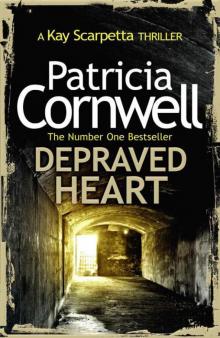 Depraved Heart
Depraved Heart Ruth, a Portrait: The Story of Ruth Bell Graham
Ruth, a Portrait: The Story of Ruth Bell Graham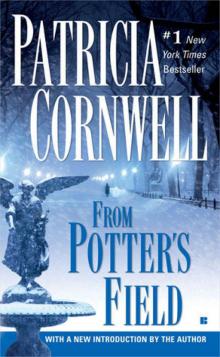 From Potter's Field
From Potter's Field Flesh and Blood
Flesh and Blood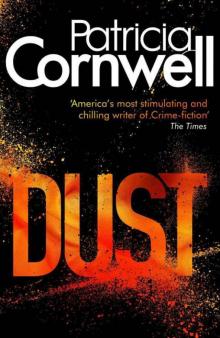 Dust
Dust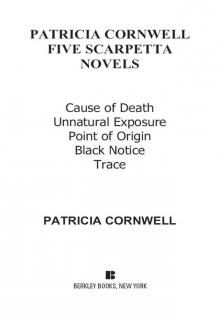 The Body Farm
The Body Farm Port Mortuary
Port Mortuary Quantum
Quantum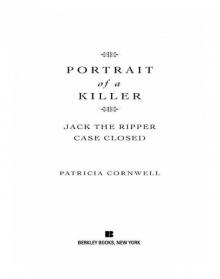 Portrait of a Killer: Jack the Ripper - Case Closed
Portrait of a Killer: Jack the Ripper - Case Closed Spin (Captain Chase)
Spin (Captain Chase)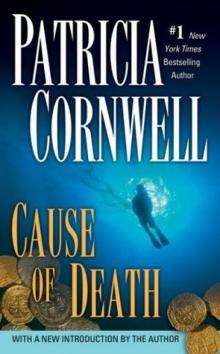 Cause of Death
Cause of Death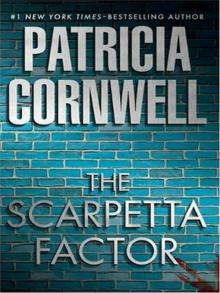 The Scarpetta Factor
The Scarpetta Factor Predator
Predator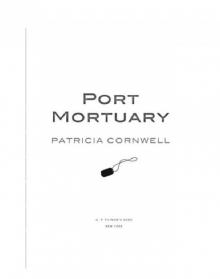 Scarpetta 18 - Port Mortuary
Scarpetta 18 - Port Mortuary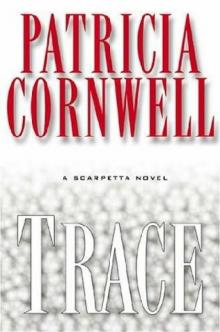 Trace ks-13
Trace ks-13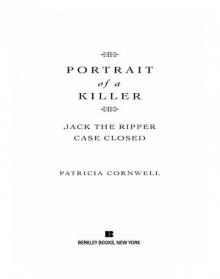 Portrait of a Killer
Portrait of a Killer Cruel and Unusual ks-4
Cruel and Unusual ks-4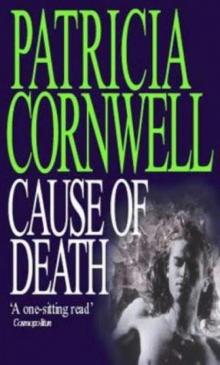 Cause Of Death ks-7
Cause Of Death ks-7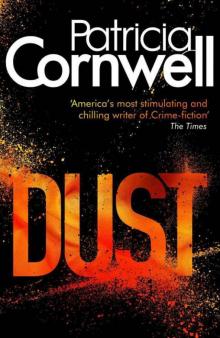 Dust ks-21
Dust ks-21 At Risk wg-1
At Risk wg-1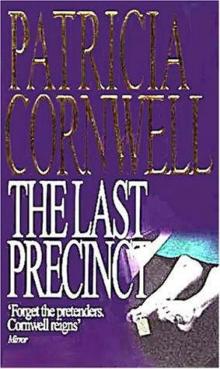 The Last Precinct ks-11
The Last Precinct ks-11 Book of the Dead ks-15
Book of the Dead ks-15 All That Remains ks-3
All That Remains ks-3 Ruth, a Portrait
Ruth, a Portrait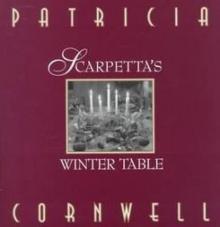 Scarpetta's Winter Table (kay scarpetta)
Scarpetta's Winter Table (kay scarpetta) From Potter's Field ks-6
From Potter's Field ks-6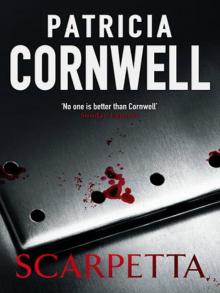 Scarpetta
Scarpetta Isle of Dogs jhabavw-3
Isle of Dogs jhabavw-3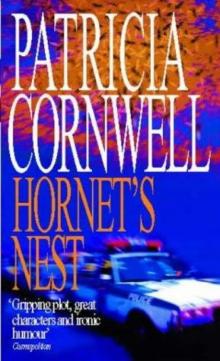 Hornet's Nest jhabavw-1
Hornet's Nest jhabavw-1 The Body Farm ks-5
The Body Farm ks-5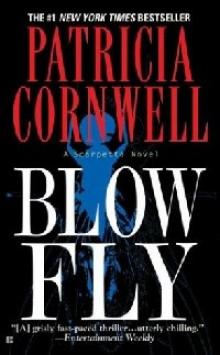 Blow Fly ks-12
Blow Fly ks-12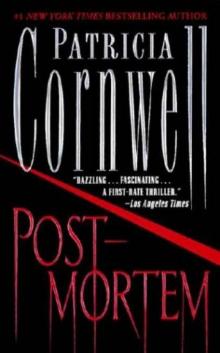 Post Mortem
Post Mortem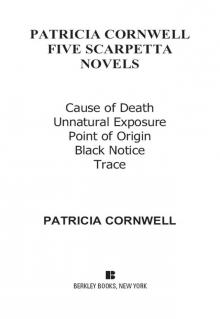 Five Scarpetta Novels
Five Scarpetta Novels Chasing the Ripper (Kindle Single)
Chasing the Ripper (Kindle Single) Point of Origin ks-9
Point of Origin ks-9 Port Mortuary (2010)
Port Mortuary (2010) Unnatural Exposure ks-8
Unnatural Exposure ks-8 Southern Cross uhabavw-2
Southern Cross uhabavw-2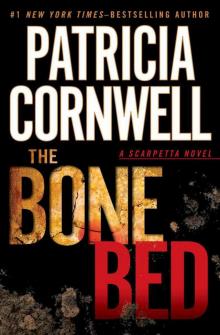 The Bone Bed ks-20
The Bone Bed ks-20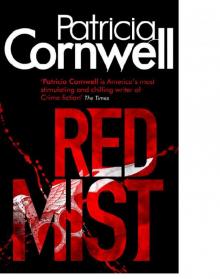 Red Mist ks-19
Red Mist ks-19 Port Mortuary (2010) ks-18
Port Mortuary (2010) ks-18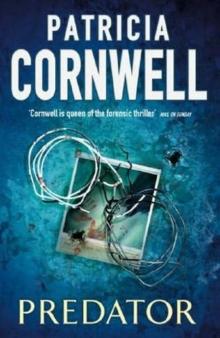 Predator ks-14
Predator ks-14